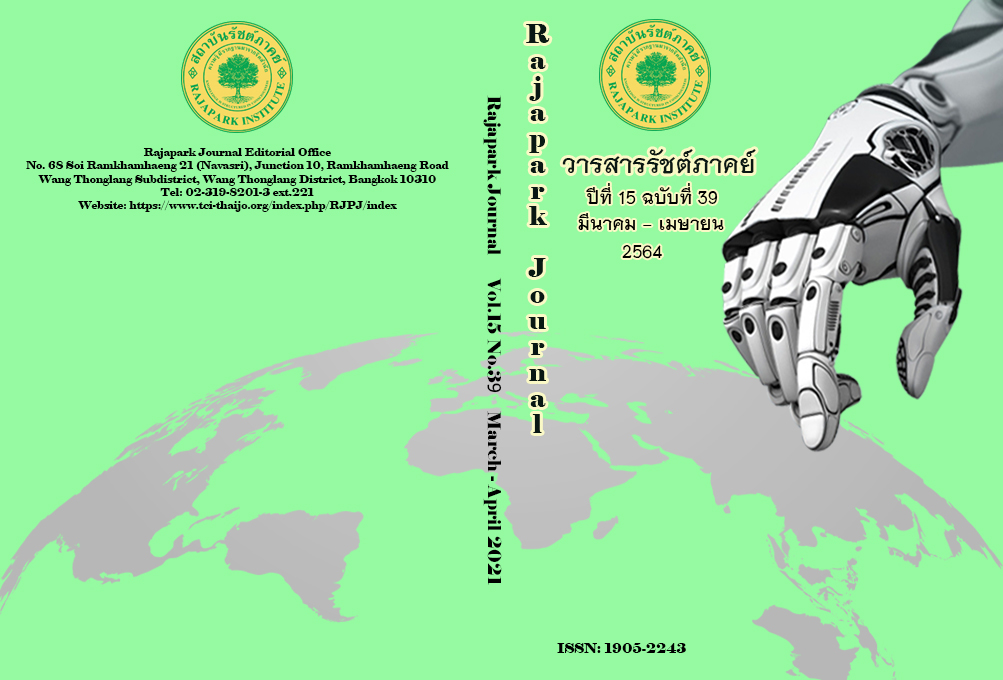การประเมินความสามารถของเกษตรกรในการใช้สมาร์โฟนเพื่อรองรับการใช้งานแอปพลิเคชันบัญชีครัวเรือน
Main Article Content
บทคัดย่อ
การวิจัยนี้มีวัตถุประสงค์เพื่อ 1) ศึกษาสภาพการจัดทำบัญชีครัวเรือนในปัจจุบัน 2) สำรวจความพร้อมด้านความรู้ความสามารถในการใช้สมาร์ทโฟน และ 3) ศึกษาปัญหาและอุปสรรคในการจัดทำบัญชีครัวเรือน กลุ่มตัวอย่าง ได้แก่ เกษตรกรภาคกลาง ในจังหวัดปทุมธานี พระนครศรีอยุธยา ฉะเชิงเทรา และนครปฐม ใช้เทคนิคการเลือกกลุ่มตัวอย่างตามความสะดวกจากเกษตรกรที่เป็นลูกค้าของธนาคารเพื่อการเกษตรและสหกรณ์การเกษตร และเลือกกลุ่มตัวอย่างแบบโควตา จังหวัดละ 100 ครัวเรือน รวม 400 ครัวเรือน สถิติที่ใช้ในการวิจัยใช้สถิติเชิงพรรณนา ได้แก่ ความถี่ ร้อยละ ค่าเฉลี่ย และค่าเบี่ยงเบนมาตรฐาน สถิติที่ใช้ในการทดสอบสมมติฐานการวิจัยใช้ไคสแคว์ และการวิเคราะห์ความแปรปรวน ผลการวิจัยพบว่า 1) กลุ่มตัวอย่างส่วนใหญ่ร้อยละ 56.8 มีการจัดทำบัญชีครัวเรือน โดยใช้สมุดบัญชีที่จัดทำขึ้นเองร้อยละ 51.5 2) เกษตรกรร้อยละ 59.8 มีอุปกรณ์สมาร์โฟน มีความสามารถในการใช้แอปพลิเคชันไลน์ และเฟชบุ๊ก คิดเป็นร้อยละ 51.3 มีความสามรถในการโทรศัพท์มือถืออยู่ในระดับปานกลาง และต้องการให้มีแอปพลิเคชันในการบันทึกบัญชีครัวเรือน 3) ปัญหาและอุปสรรคในการจัดทำบัญชีครัวเรือน 3 อันดับแรกที่เป็นปัญหามากที่สุด ได้แก่ ขาดความรู้ความเข้าใจในการบันทึกบัญชี ไม่สามารถจดจำรายการใช้จ่ายในวันที่ผ่านมาได้ และขาดความช่วยเหลือจากเจ้าหน้าที่ของรัฐ ผลการทดสอบสมมติฐานพบว่า 1) อายุมีความสัมพันธ์กับความสามารถในการใช้โทรศัพท์มือถือ ที่ระดับนัยสำคัญ 0.049 และ 2) ระดับการศึกษามีความสัมพันธ์ปัญหาในการจัดทำบัญชีครัวเรือน เรื่องการไม่ได้รับการอบรมอย่างต่อเนื่อง และการจัดอบรมไม่สม่ำเสมอ ที่ระดับนัยสำคัญ 0.046 และ 0.010 ตามลำดับ
Article Details
ทัศนะและความคิดเห็นที่ปรากฏในวารสาร ถือเป็นความรับผิดชอบของผู้เขียนบทความนั้น และไม่ถือเป็นทัศนะและความรับผิดชอบของกองบรรณาธิการ
เอกสารอ้างอิง
Brand Buffet. (2019). The survey shows people of different ages have different behavior of locking a phone. Older people want more automatic locking. Retrieved February 27, 2021, from https://www.brandbuffet.in.th/2019/06/age-influence-how-lock-smartphone-behavior/
Chaipinchana, P. (2014). Development of Household Accounting System Under Sufficiency Economy Philosophy with Participation of Community, Nong Pa Krung Sub-district, Muang District, Chiang Mai Province. Journal of Community Development and Life Quality, 2(1), 37-48.
Chawanote, C. (2019). The study of the behavior and financial situation of households on debt Problems, Research. Retrieved January 9, 2021 from file:///C:/Users/bc316/Downloads/research%203.62.pdf
Chanwimalueng, W., & Polnigongit, W. (2018). A Study of Usability of Elderly Upon Button Size and Shape on Smartphone for Creating Fuzzy Logic Model. Journal of Srinakharinwirot University (Journal of Science and Technology), 10(19), 121-135.
Gimnguansong, M. (2008). Factors affecting household accounting of farmers who were customers of the Bank for Agriculture and Agricultural Cooperatives, Bang Nam Priao Branch, Chachoengsao. Master of Science (Department of Cooperative Economics). Maejo University.
Henchokchaichana, N. (2016). Sufficiency Accounting: Poverty Solution. Journal of Accounting Professional, 12(36), 76-84.
Kasikorn Research Center. (2020). Rising household debt, negative economic situation. Retrieved January 9, 2021, from www.Kasikornresearch.com.
Kusantiea, A. (2019). Farmer’s debt, solutions, financial principles or structural problems. Retrieved January 9, 2021, from https://www.landactionthai.org/2012-05-18-03-24-45/article /item/2274-2019-06-09-06-31-50.html
Lomchimplee, K. (2014). Factors affecting The Accounting pople Baan Bang Pho Nuea Pathum thani, Research. Master of Business Administration. Rajamangala University of Technology Phra Nakhon.
Maitrejit, Ameorn. (2017). Factors Effecting of Household Accounting, Wat Bangkhantaed Sub-district Muang district, Samutsongkram Province. SAU JOURNAL OF SOCIAL SCIENCES & HUMANILITIES, 1(2), 33-39.
Maneemai, P. et al. (2018). Accounting Practices under the Sufficiency Economy philosophy: the case Study of Farmers Participating in the Large Agricultural Land Plot Project, Thumbol Na-Kaosia, Nayong District, Trang Province. Journal of Social Development, 20(2), 17-33.
Manokarn, S. (2017). Developing Household Account Preparation for Self-reliance in Baan Na Lae Community Silalang Sub-district, Pua district, Nan province. Master of Science (Geosocial Based Sustainable Development). Maejo University.
National Statistical Office. (n.p.). Agriculture and Fisheries Branch; Number of farmer households registered by province: 2014 – 2019. Retrieved January 9, 2021, from http://statbbi.nso.go.th/staticreport/page/sector/en/11.aspx
Nilmanee, T., Pongput, S., Saewong, J., & Imchongchairak, O. (2015). The study behavior and Factor Problems on household accounting of Agriculturist in Prachinburi province. Research. Rajamangala University of Technology Rattanakosin.
Phumcharern, P. (2016). Guidelines for controlling factors affecting the recording of Household income And Expense statement by agriculturists in Thailand. Master of Business Administration. Faculty of Commerce and Accountancy, Thammasat University.
Ruangsinpinya, P. (2012). Household account: a close matter that has been overlooked. MIS Journal of Narasuan University, 7(1), 20-28.
Sanserm, S. K. (2015). Learning Behavior Patterns and Learning Conditions of Information Technology Usage of Farmers. Electronic journal of Open and Distance Innovative Learning (e-JODIL), 5(2), 87-105.
Srisuwan, J., Polnigongit, W., & Khopolklang, N. (2011). Factors affecting the usability of icons on the mobile phone screen. Suranaree J. Soc. Sci., 5(2), 93-107.
Stock Exchange of Thailand. (2010). Personal Financial Management. Bangkok: Boonsiri Printing Limited.
Sriyom, U., & Buangam, P. (2018). Android Application Development for Household Accounting in Area of Nakon Si Thammarat Province. Far Eastern University Academic Review Journal, 12(2), 57-69.
Yamane, T. (1967). Statistic: An Introductory Analysis (2nd ed.). New York: Harper & Row.


